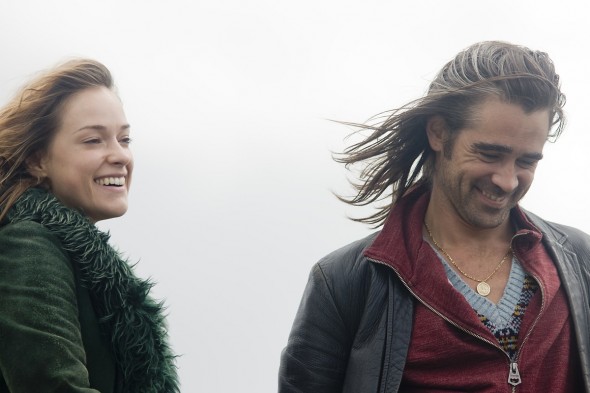There is an odd charm to the romantic fantasy Ondine that makes it watchable for about half of its running time. Established writer-director Neil Jordan (The Crying Game) is able to work well with cinematographer Christopher Doyle to create a film of visual entrancement. The problem here is that the story never takes off and, even worse, doesn’t have much of an attention-getting quality to begin with.
The main character is Syracuse, an Irish fisherman played by Colin Farrell. Since his divorce, Syracuse has made good on his promise to stay sober so that he can remain a viable role model for his daughter Annie (Alison Barry), who suffers from kidney failure. He isn’t a churchgoer, but he makes frequent visits the local priest (Stephen Rea) to confess his wrongdoings. He is a good man at heart, and Farrell makes him easy to like.
At the start of the film, we are introduced to the title character (Alicja Bachleda), whom Syracuse inexplicably finds in his fishing net one cloudy afternoon. Ondine is incredibly flustered when Syracuse brings her on board (and possibly even experiencing short-term memory loss), which makes it impossible for Syracuse to determine what type of creature she is. Is she a human? A mermaid? A selkie? More importantly, do we care?
Jordan tries to get us to care through the relationships that blossom because of Ondine’s appearance. She becomes close with both Syracuse and Annie, which brings the father and daughter closer together as well. Annie begins to spend less time with her real mother (Dervla Kirwan) so that she can be with her father and Ondine. All of this is well-done, and even though there isn’t any legitimate conflict, the first half of Ondine manages to engage more than it actually should.
The story takes a dreadful turn for the worse in its third act, which provides an answer to Ondine’s origins that is completely incoherent with the tone and spirit of the first half. It is a typical (and disappointing) Hollywood ending to what initially feels like a very independent picture. Granted, there is not much of a story to being with, but the way Jordan chooses to conclude his story doesn’t nearly match the audacity of some of his earlier films.
The inconsistency of the acting is also an issue. Farrell is solid in the lead role, although I wonder if audiences will have trouble believing him as a struggling fisherman, especially when he’s packing the heavy Irish accent. On the other hand, the lack of a public image for Bachleda – giving her an aura of mystery – often plays as a strength to her character. But she seems more comfortable in the first half, playing the attractive mystery woman, than she does in the final portions, when her true identity is confronted. I also think that Jordan put too heavy of a burden on the shoulders of Alison Barry. She is adorable, but the amount of intelligence this character is expected to have would have been difficult for any actress of Barry‘s age to pull off. (There is a shot of Barry sitting with several lengthy selkie textbooks in front of her. Can we really expect a girl her age to sit and read through all of those pages?)
Another thing which prevents Ondine from hitting home is the way it begins. Syracuse catches Ondine in the film’s first scene, meaning all that we learn of Syracuse (his drunk and troubled past, his failed marriage) is played out through dialogue. This wouldn’t necessarily be a problem if Syracuse’s past wasn’t filled with cliches, and if Jordan didn’t rely so much on the character’s past for the final emotional impact. It makes the third act turn of Farrell‘s character, in particular, very tough to believe.
There are some moments during the film in which you truly feel like you’re in the hands of a skilled filmmaker. The lively banter during the confession scenes between Farrell and Rea is one of the main highlights, as is the striking underwater camera shots. Unfortunately, Ondine ends up being only one-half of a decent film, with a disastrous conclusion that, frankly, shouldn’t be associated with a filmmaker of Jordan‘s caliber.
5 out of 10
What did you think of Ondine?


